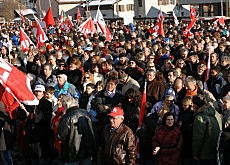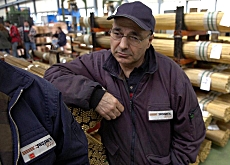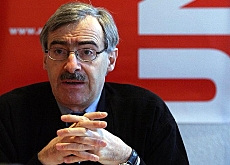Unions and employers up war of words

Swiss trade unions and employer associations are at loggerheads over a threat of strikes at key road and rail construction sites.
Employers have said they will tear up collective work contracts if the unions go ahead with the strikes – which are a relatively rare occurrence in the country.
The latest war of words was ignited by a decision by the construction firm, Marti, to raise the working hours from 45 to 48 hours a week for its employees, to make up for time lost when poor weather prevented work at its building sites.
On Friday, Switzerland’s largest trade union, Unia, called on its members to down their tools at the Islisberg motorway tunnel between Zurich and Zug if Marti had not withdrawn the plan by the evening.
Marti, through the Master Builders’ Association, countered that the move would force it to tear up its collective agreement with its employees.
A strike was averted when Marti announced it would not introduce the longer working hours before April 2.
Saturday premium
It comes not long after Unia threatened a strike at one of the construction sites of the north-south Gotthard rail tunnel if its members were not given a 25 per cent premium for working on Saturdays.
The threat led to a renewal of contract negotiations between Unia and the management of the different companies working to construct what will become the world’s longest railway tunnel at 57 kilometres.
Construction of the tunnel has already undergone a series of delays and cost overruns, and the builder, the Swiss Federal Railways (a public company) can ill afford more setbacks.
“Unia takes every opportunity to stir up workers by threatening strikes,” Werner Messmer, president of the Master Builders’ Association, told the newspaper, NZZ am Sonntag.
Last resort
Messmer said Unia was acting in bad faith by not upholding its part of labour agreements obliging it to seek talks and only using the threat of strikes as a last resort.
Switzerland’s constitution has only contained an explicit right to strike since it was revised in 2000.
Analysts say employers’ associations are still reeling from a 30-day walkout at the metal foundry, Swissmetal in Reconvilier.
The company wants to close the plant, affecting 120 jobs.
Workers went back to work a month ago after agreeing to conditions for mediation between Swissmetal bosses and Unia.
Eye for eye
“The method, an eye for an eye, a tooth for a tooth doesn’t work,” Peter Hasler, director of the Swiss Employers’ Association told the NZZ am Sonntag.
Hasler said in case of disputes, the collective contracts lay out clearly defined mediation procedures, including going to the courts if necessary.
He said if the unions continued to breach the agreements, employers would have to ask themselves if collective labour accords were worth signing in the first place.
“We only strike when there is no other choice,” countered Vasco Pedrina, Unia co-president, in the same Sunday newspaper, listing four occasions when Unia members manned picket lines.
Pedrina said the employers’ association had used its verbal attacks in order to weaken the country’s most powerful union, which claims 200,000 members.
The president of the Swiss Federation of Trade Unions, Paul Rechsteiner, speaking in the SonntagsZeitung newspaper, accused the strike at Swissmetal on “the arrogant behaviour of today’s managers”.
He said there was no certainty that a future buyer of the foundry would go ahead with the planned layoffs.
swissinfo with agencies
When the constitution was revised in 2000 to include the right to strike, it was feared it would open the floodgates to a wave of strikes.
However, strikes are still a rare occurrence and up to 2002, only 7-8 days per year per 100,000 employees were lost through strikes.
Switzerland’s largest trade union, Unia, is the negotiating partner for some 500 collective work contracts in 80 different sectors of the economy, representing a total of one million employees.
For 2006, Unia says it wants to focus on salary increases and making wages equal for men and women.

In compliance with the JTI standards
More: SWI swissinfo.ch certified by the Journalism Trust Initiative


You can find an overview of ongoing debates with our journalists here . Please join us!
If you want to start a conversation about a topic raised in this article or want to report factual errors, email us at english@swissinfo.ch.